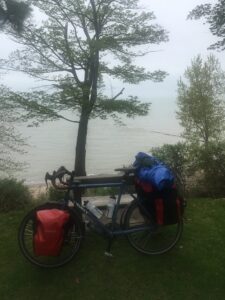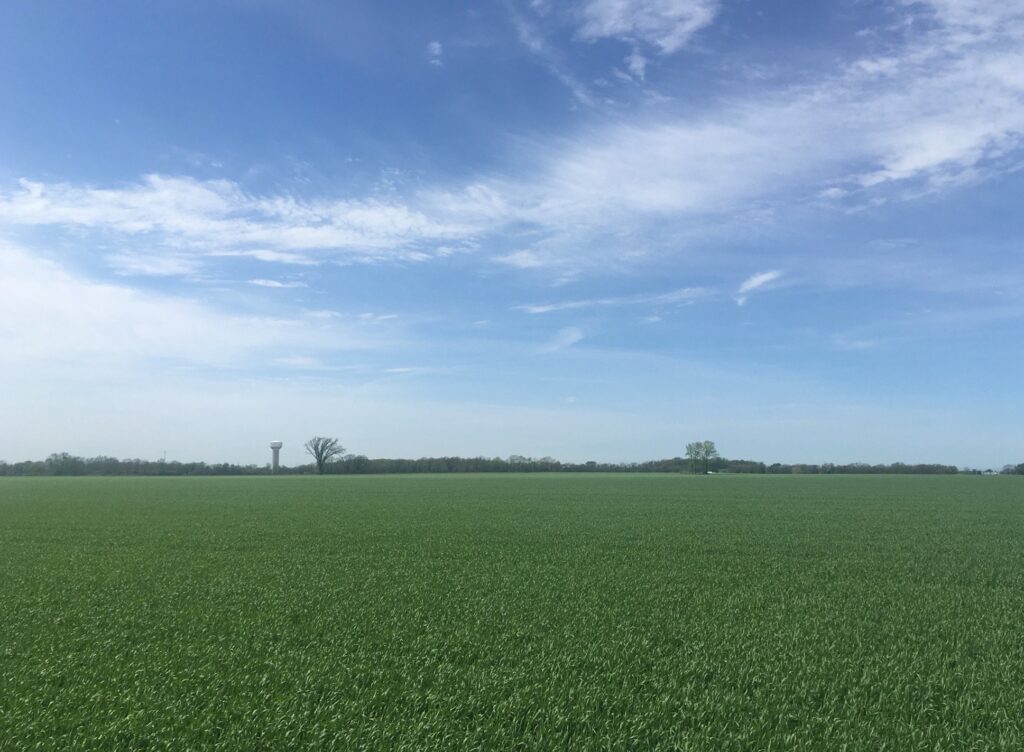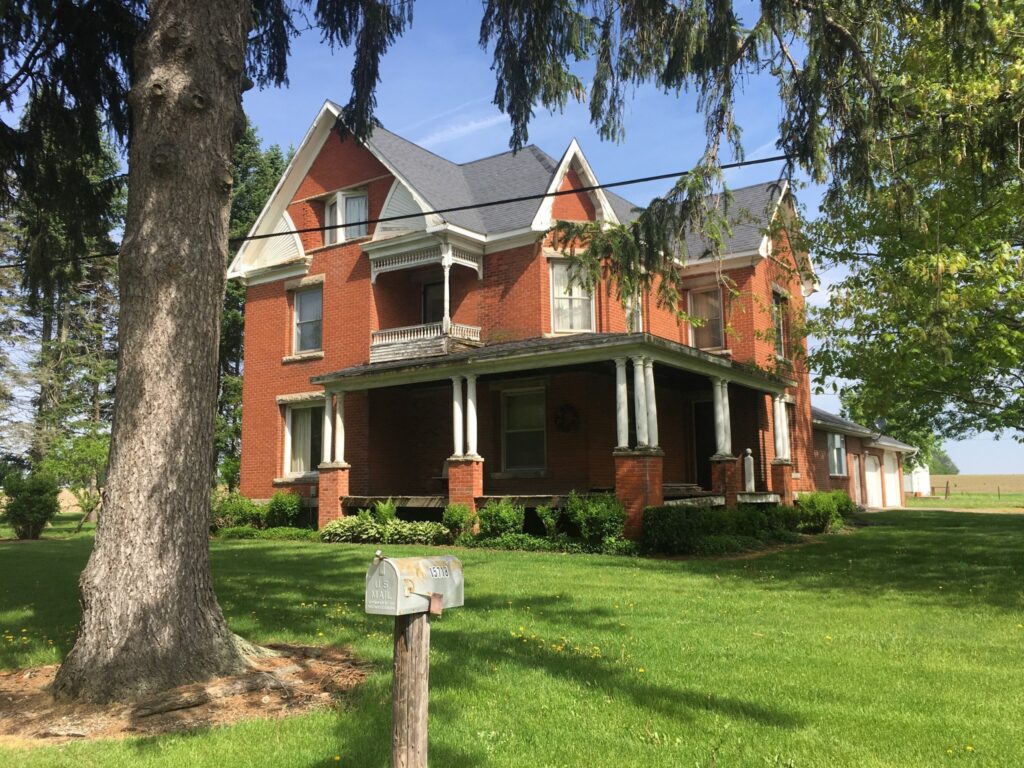
I am at the end of the fourth week of this trip across the United States. So far, I’ve ridden 1367 miles to reach the vicinity of Wabash, Indiana.
Along the way, I have thought about how a taking a long bike tour, especially alone like this, is like Henry David Thoreau’s Walden, only on two wheels. Like he did at Walden Pond, you have lots of time to think about things. Did he also sometimes drive himself to near madness with his thoughts? He might have left that part out. Occasionally I have caught myself riding down the road, practically oblivious to the fact that I was traveling down a narrow-shouldered two-lane highway with eighteen wheelers roaring past, completely in my head, having a raging dialog about something related to work, or some political outrage that so easy to find in the news now. Oh, the monkey mind! Give it a banana and tell it to shut up. Geez! That last car was close!
Like Thoreau on Walden Pond, taking a bike tour, or riding a bicycle for the purpose of transporting oneself for any reason, is a defiance, a rebellion against the onslaught of technology. Writing when the Industrial Revolution was getting into full swing, he wrote in Walden: “We have constructed a fate, an Atropos, that never turns aside. (Let that be the name of your engine.)” That would definitely seem to be our predicament. How do we turn this fate aside and get on our own track?
Not that a bicycle isn’t technology. It certainly is. But it is appropriate technology. Our condition is so much the result of our failure to use any technology appropriately. The dominant culture encourages us to do just about anything but that. So, riding a bike, or growing a garden in your backyard, buying second hand, fixing things instead of throwing them away, or interacting with your neighbors instead of Facebook, are all radical acts of rebellion. I am certain that the current order would be toppled if enough people were to start doing these things.

One thing I have to say about Thoreau is that his work is sometimes cited in American culture in a way that the Bible is cited to rationalize selfishness and injustice. For example, “That government which rules best, rules least.” This little bumper sticker is one of the keystones of libertarian and conservative thought. If I could, I would transport myself back to Massachusetts circa 1848 and try to convince him to change that on to “That government which rules best, rules most compassionately.” OK. That is not as catchy, I know. How about “That government that rules most fashionably…”. I give up. Let me know what you come up with.
Thoreau intended his not paying taxes as an act of civil disobedience in protest of the Mexican-American War, which is another example of the United States drumming up a pretense to start an unjust military action. In this case, the real motivation of the United States was the land grab that stole what is now California, Arizona, and New Mexico from Mexico. I don’t know if he would be onboard with the libertarian sense of “That government which rules best”, which is to undermine a system of progressive taxation vital to compassionate governance and also necessary for the stability of a complex society.

Incidentally, support for progressive taxation was commonly supported among most of the clergy in the United States after the Great Depression and the resulting passage of the New Deal. It was called the Social Gospel and supported as the way to realize the compassion of Jesus Christ through good governance. And then, as Kevin M Kruze documents in, One Nation Under God: How Corporate America Invented Christian America, along came the American Manufacturers Association in the 50s, to convince enough of the clergy that somehow the New Deal was a threat to their freedom of worship; that the compassionate governance it sought to implement was a budding Communist threat that would replace Christianity with state-enforced atheism. Hence, was born the twisted polymorph of libertarianism, laissez-faire capitalism, and toxic religiosity that gave rise to Trumpism.
Whoa. There goes another one of those political ruminations racing away with my mind again. Back to Walden Pond. When my route takes me off of the busy roads, into the woods, past the lakes, and the farms, it takes me back to the basics. No car. No car radio. I have just the breeze and birdsong in my ears.
The birds have cheered me along so. One thing I love about the eastern woods is that there is a lot more dialog from the animal kingdom than I ever hear in the Pacific Northwest. I don’t know what species of birds they are here, especially having been in some of these parts of the country for the first time in my life. As I have moved west, the songs and birds have changed. Some of them may have changed as various species migrate northward. I’ve tried to assign English syllables to their songs so that maybe I can look them up once I have a chance.
From Maine through the Adirondacks and well into New York State along Lake Ontario, I heard “Hey Cutie, hey cutie, hey cutie.” And another one: pretty-pretty-pretty-pretty. I am sure they weren’t talking about me. Maybe this one was though: weirdo-weirdo-weirdo!
Camping in an Indiana state forest, I kept hearing this pretty song that went bid-a-dee bid-a-dee-bid-a-dee. When I hear these virtuoso solo performances, I try to look up in the trees to see if I can identify the singer by sight. Not having field glasses, I am usually not successful. But for this act, I looked up and caught a beautiful red cardinal singing away. He was trading calls with another of his kind deeper in the forest. Having been raised in Missouri, where these crimson-colored birds are common, I should have known that one already.
One encouraging bird song I heard back in New York close to Lake Ontario went: you-can-you-can-you-can-be-a-birder, you-can-you-can-be-a-birder. After taking this trip, I certainly will be inspired to be one.

One more thing about Thoreau: as is well-known, his essay Civil Disobedience was an inspiration for Gandhi, and also the civil rights movement led by Martin Luther King, Jr. And it should also inspire us now as we seek to overcome the tyranny of corporate wealth that seeks to enrich itself at the cost of the rest of us and all creation for that matter. They have corrupted the system such that non-violent civil disobedience may be our only recourse for realizing the change we so desperately need.
And so, that is why on this trip I am trying to raise funds for two organizations whose missions are to grow and support mass movements seeking systemic change through non-violent civil disobedience. One of them I think Thoreau might have found helpful in his protest against the Mexican-American War: the Civil Liberties Defense Center. The other is the Poor Peoples Campaign, which seeks to reinvigorate the movement started 50 years ago by Martin Luther King, Jr. If you have donated to one them already, thank you. If not, please consider hitting either or both of the links below to learn more about each organization and make a donation.